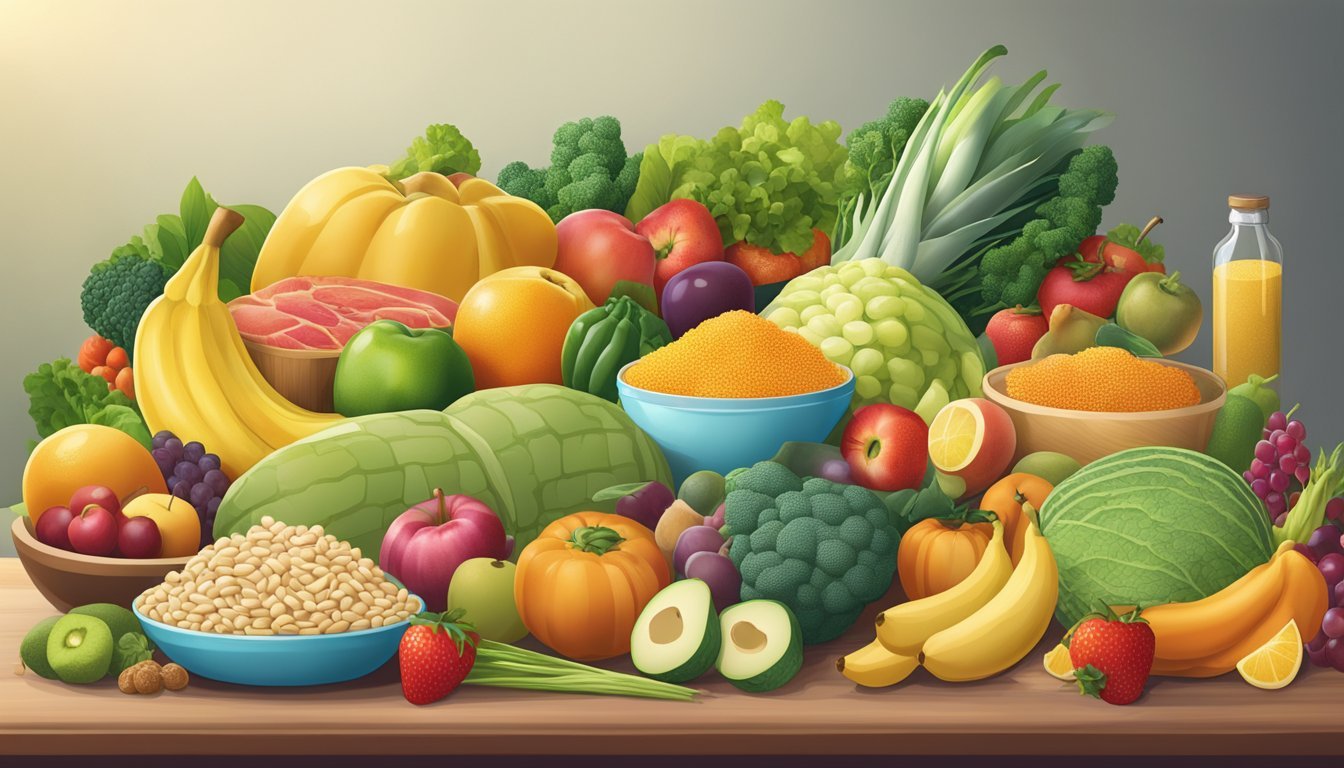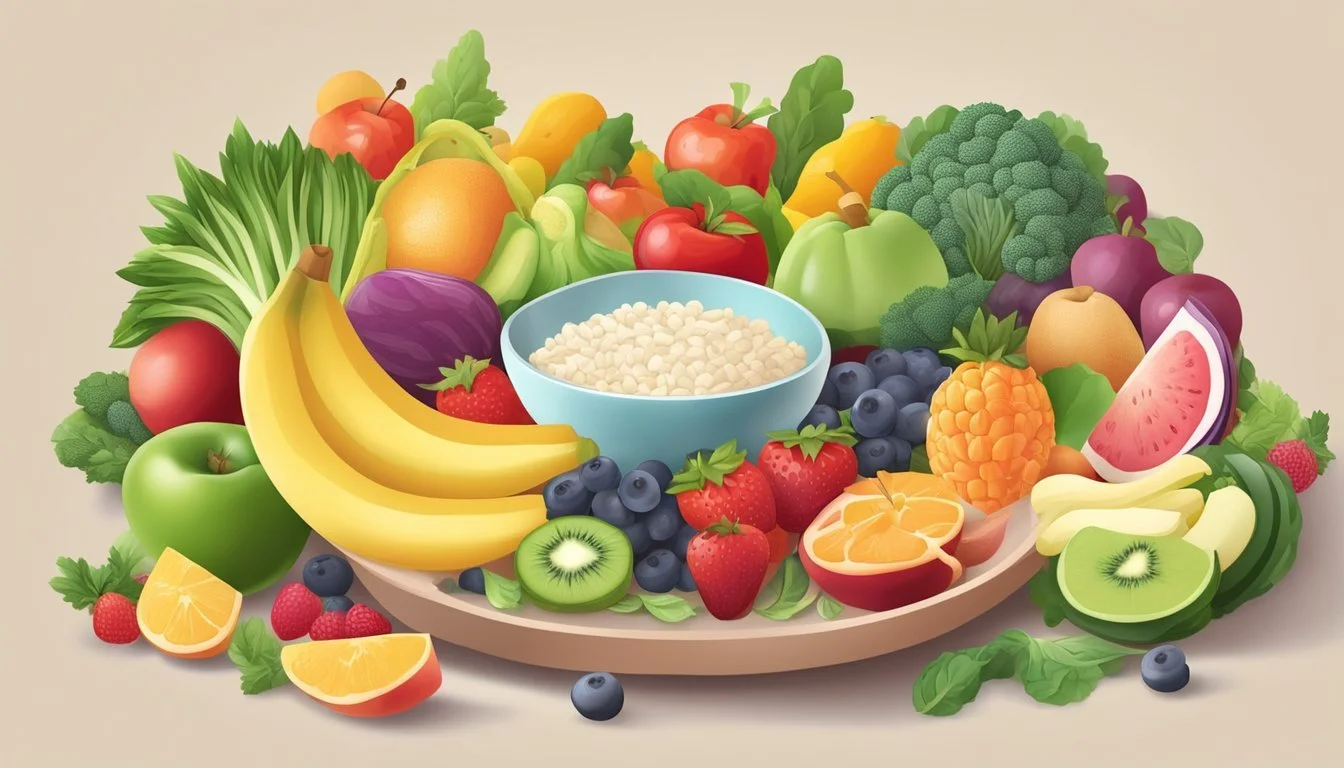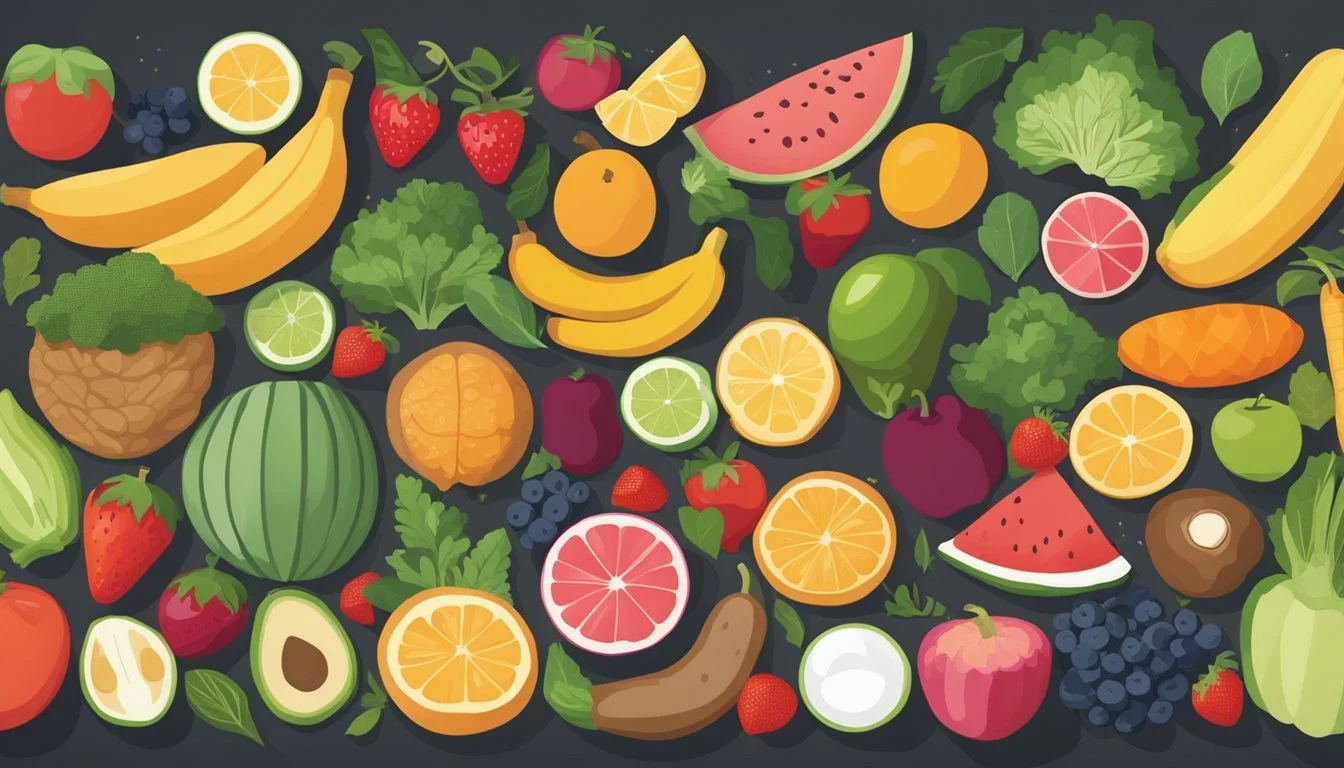The Best Foods for a Healthy Pregnancy and Fetal Development
Essential Nutrition Guide
Maintaining a balanced and nutritious diet is pivotal for the health of both the expectant mother and the developing fetus during pregnancy. Nutritionists and healthcare professionals stress the importance of incorporating a variety of foods that are rich in essential nutrients to support fetal growth and the mother's well-being. A diet that includes fruits, vegetables, whole grains, protein sources, and dairy products not only contributes to the normal development of the fetus but also prepares the mother's body for the demands of pregnancy and lactation.
Specific nutrients have been identified as particularly beneficial during this stage. Folic acid, found in leafy greens and fortified cereals, is crucial for the prevention of neural tube defects, while calcium and vitamin D, found in dairy products and certain fish, are vital for bone development. Additionally, foods rich in iron, such as lean meats and legumes, combat maternal anemia by facilitating healthy blood supply critical for oxygen transport to the fetus. Meanwhile, omega-3 fatty acids, commonly found in low-mercury seafood, support brain development.
Choosing a diet that limits saturated fats, added sugars, and sodium is equally important to reduce the risk of pregnancy complications and chronic diseases later in the life of the child. By focusing on whole foods and a variety of nutrient-dense options, pregnant women can create a favorable environment for fetal development and potentially ease common pregnancy-related symptoms, enhancing the overall pregnancy experience.
Understanding the Basics of Pregnancy Nutrition
Eating a balanced diet during pregnancy supports fetal health and development. It’s crucial to know which nutrients are needed and what food practices ensure safety.
Importance of Balanced Diet in Pregnancy
A balanced diet includes a variety of nutrients that cater to both the mother's health and the baby's growth. Protein supports tissue growth, while carbohydrates provide energy. Fats contribute to the development of a baby's brain. Essential vitamins and minerals aid in critical developmental processes.
Folate, for example, is vital for forming the neural tube, and calcium and vitamin D support bone development. Expecting mothers should aim for nutrient-dense foods: lean proteins, whole grains, fruits, and vegetables.
Key Nutrients for Fetal Development
For optimal fetal development, specific nutrients are necessary:
Folate: Reduces the risk of neural tube defects. Sources include leafy greens, citrus fruits, and beans.
Iron: Helps in the production of hemoglobin which is essential for oxygen transport to the fetus. Meats, beans, and spinach are good sources.
Calcium: Important for building strong bones. Found in dairy products, fortified foods, and leafy greens.
Omega-3 fatty acids: Critical for brain development. Sources include low-mercury fish like salmon (What wine goes well with salmon?) and flaxseeds.
Safe Food Practices for Expecting Mothers
Food safety is paramount during pregnancy to protect against foodborne illnesses that can affect fetal health. Expecting mothers should:
Avoid unpasteurized products: These can contain harmful bacteria.
Handle foods properly: Wash hands, utensils, and fruits or vegetables.
Cook meats thoroughly: This minimizes the risk of infections like toxoplasmosis.
Limit certain fish: Reduce intake of high-mercury fish to avoid potential harm to the developing nervous system.
Essential Vitamins and Their Food Sources
A pregnant woman's diet needs to be rich in essential vitamins for her health and the development of the fetus. Specific vitamins support critical developmental processes and contribute to the mother's well-being.
Folate and Neural Tube Development
Folate, or vitamin B9, is crucial for preventing neural tube defects in the developing fetus. Folate-rich foods include:
Legumes (lentils, peas, beans, chickpeas)
Dark leafy greens (spinach, kale)
Asparagus (boiled)
Oranges
Nuts (peanuts) Taking a daily prenatal vitamin that contains folate is also recommended for added assurance.
Vitamin D and Bone Health
Vitamin D is essential for the development of healthy fetal bones and teeth. A deficiency can lead to bone-related complications. Pregnant women can find vitamin D in:
Fortified milk
Fatty fish (salmon, mackerel)
Sunshine, which facilitates the body's vitamin D production A daily intake of 600 IU (15 mcg) is generally advised, not exceeding 4000 IU.
Vitamin C for Iron Absorption
Vitamin C boosts iron absorption, which is vital for making hemoglobin in red blood cells. Iron carries oxygen to both the mother's and baby's tissues. Foods rich in vitamin C include:
Citrus fruits (oranges, lemons)
Bell peppers
Strawberries
Broccoli
Tomatoes The inclusion of vitamin C-rich foods can enhance the absorption of iron from plant-based iron sources.
B Vitamins for Energy and Growth
B vitamins, specifically B2 (riboflavin), B3 (niacin), B6, and B12, support cellular energy production and the formation of red blood cells. Sources for these vitamins are:
Milk (vitamin B2)
Meat, fish (vitamin B3, B12)
Eggs (vitamin B2, B12)
Dairy products (vitamin B2)
Green leafy vegetables (vitamin B2)
Whole grains (fortified with various B vitamins)
Nuts (vitamin B2)
During pregnancy, B vitamins help meet the increased energy demands and assist in fetal growth.
The Role of Macronutrients in Pregnancy
During pregnancy, macronutrients - proteins, healthy fats, and carbohydrates - play crucial roles not only in maintaining the mother's health but also in facilitating the baby's growth and development. These macronutrients serve as the building blocks of new tissues, provide essential fatty acids for brain development, and supply the energy needed for these processes.
Proteins for Growth and Repair
Protein is vital for the growth and repair of both the mother's and baby's tissues. Pregnant women should include adequate amounts of protein in their diet to support the rapid cellular development of the fetus and to maintain maternal muscle mass and organ function. Sources of high-quality protein include:
Lean meats: chicken, turkey, and lean cuts of beef
Eggs: a complete source of essential amino acids
Legumes: beans, lentils, and chickpeas
Dairy products: milk, cheese, and yogurt
Healthy Fats for Brain Development
Healthy fats, particularly omega-3 fatty acids, are essential for the baby's brain development. Omega-3s are found in cell membranes and are necessary for the formation of the neural connections in the brain. Pregnant women should consume foods rich in omega-3s, such as:
Fish: salmon, mackerel, and sardines
Nuts and seeds: flaxseeds, chia seeds, and walnuts
Plant oils: flaxseed oil and canola oil
Intake of these healthy fats should be balanced to support fetal growth without compromising the mother's health.
Carbohydrates for Necessary Energy
Carbohydrates are the primary energy source for the body's day-to-day functioning. During pregnancy, they provide the energy required for the developing fetus and support the mother's metabolism and nutrient transport. Pregnant women should focus on complex carbohydrates, which also offer fiber and essential nutrients:
Whole grains: brown rice, whole wheat bread, and oats
Fruits: bananas, apples, and oranges
Vegetables: leafy greens, carrots, and sweet potatoes
These foods will help sustain energy levels throughout pregnancy while contributing to overall nutrient intake.
Important Minerals for Pregnancy Health
Minerals play crucial roles in ensuring a healthy pregnancy and optimal fetal development. Particularly, calcium, iron, magnesium, and zinc are imperative for various bodily functions in both the mother and the growing baby.
Calcium-Rich Foods for Mother and Baby
Calcium is vital for the development of strong bones and teeth in the fetus, as well as maintaining the mother's bone density. Pregnant women should aim to consume adequate calcium to support this development.
Dairy Products: Milk, cheese, and yogurt are excellent sources of calcium.
Plant-Based Options: For those who are lactose intolerant, fortified plant milks, almonds, and leafy greens like spinach can help meet calcium needs.
Iron to Prevent Anemia
Iron is a mineral that's necessary for the production of hemoglobin, which carries oxygen in the blood. An adequate iron intake during pregnancy helps prevent anemia, a condition characterized by fatigue and weakness.
Meats: Beef and poultry are rich in heme iron, which is easily absorbed.
Vegetarian Sources: Lentils, beans, and iron-fortified cereals provide non-heme iron. Consuming these with vitamin C-rich foods can enhance absorption.
Recommended Iron Intake: Pregnant women need about 27 mg of iron per day.
Magnesium for Muscle and Nerve Function
Magnesium contributes to muscle health and prevents cramping. It also supports a healthy nervous system in both the mother and fetus.
Nuts and Seeds: Almonds, cashews, and pumpkin seeds.
Legumes: Black beans and edamame are good sources of magnesium.
Daily Magnesium Needs: 350–360 mg for pregnant women over 19, 400 mg for those 18 and under.
Zinc for Immune System Support
Zinc is essential for the immune system and aids in the proper functioning of enzymes. It's important for pregnant women to ensure they're getting enough zinc to support their own and their baby's immune health.
Meat: Chicken and red meat offer high amounts of zinc.
Plant-Based Sources: Chickpeas, kidney beans, and nuts like peanuts provide zinc for those on a vegetarian or vegan diet.
Incorporating these minerals into one's diet can contribute to a healthy pregnancy and robust fetal development, setting the stage for overall well-being.
Top Food Choices for a Healthy Pregnancy
Eating nutritious foods during pregnancy is crucial for supporting the baby's development and the mother's health. This section will cover diverse food options across various food groups that provide essential nutrients for a healthy pregnancy.
Incorporating Dairy Products for Calcium and Protein
Dairy products are excellent sources of calcium and protein, both vital for bone health and fetal growth. Aim for fat-free or low-fat options such as yogurt and milk to reduce intake of saturated fats.
Lean Meats and Poultry for Iron and Protein
Lean meats and poultry supply significant amounts of iron and protein, which are critical for supporting an increase in blood volume and the baby's muscle growth. It's essential to consume these in moderation and ensure they are cooked thoroughly.
Fatty Fish and Seafood for Omega-3s
Fatty fish and seafood are high in omega-3 fatty acids, important for brain and eye development. Pregnant individuals should opt for low-mercury options like salmon and trout, and limit consumption to 2-3 servings per week.
Beans, Lentils, and Legumes for Fiber
High in fiber, beans, lentils, and legumes also provide protein and are a plant-based nutrient powerhouse. These contribute to feeling full, which can help manage weight and stabilize blood sugar levels.
Whole Grains for Energy and Fiber
Whole grains provide sustained energy and are a solid source of fiber. Foods like brown rice, oatmeal, and whole-wheat bread help maintain energy levels and aid in digestion, preventing constipation.
Fruits and Vegetables for Antioxidants and Vitamins
A colorful array of fruits and vegetables deliver crucial vitamins and antioxidants. They contribute to a strong immune system and are essential for the overall health of the mother and the development of the baby.
Healthy Snack Options
Opt for snacks that contribute to nutrient intake rather than empty calories. These include:
Nuts and seeds: Rich in healthy fats and protein.
Sliced fruits and vegetables: Pack a vitamin punch and are high in fiber.
Whole grain crackers and cheese: Balance of carbohydrates and protein.
Remember to maintain a balanced diet and consult a healthcare provider for personalized dietary advice.
Special Considerations in Pregnancy Diet
During pregnancy, a woman's body requires additional nutrients, vitamins, and minerals to support fetal growth and maternal health. It's important to carefully manage weight gain, nourish the body with the right types of food, and ensure adequate intake of specific nutrients through both diet and supplementation.
Managing Weight Gain During Pregnancy
Pregnant women should aim for a steady, healthy weight gain, as it is crucial for the baby's growth and development. The amount of weight gain recommended varies based on the woman's pre-pregnancy weight. Generally, a woman of normal weight should gain about 25 to 35 pounds during pregnancy. Increased calorie intake should be modest; it's commonly advised that women consume an extra 300-500 calories per day during the second and third trimesters.
Addressing Constipation with Dietary Choices
Constipation is a common concern during pregnancy, which can be alleviated by eating high-fiber foods such as fruits, vegetables, beans, lentils, whole grains, and nuts. Staying hydrated by drinking plenty of water and including physical activity in the daily routine can also help maintain bowel regularity.
Foods to Avoid and Limit in Pregnancy
Certain foods pose risks to the developing fetus and should be avoided:
Alcohol: Completely avoid alcohol to eliminate the risk of fetal alcohol syndrome and low birth weight.
Mercury: High-mercury fish (e.g., swordfish, shark, king mackerel) should be avoided due to potential harm to the developing nervous system.
Limit the following for better pregnancy outcomes:
Caffeine: Moderate intake, not exceeding 200 mg per day.
Processed foods: High in sodium and unhealthy fats, these should be eaten sparingly.
Diet Considerations for Vegetarian Pregnancies
Vegetarian pregnant women should ensure adequate intake of essential nutrients that are typically found in animal products. Key nutrients include protein, omega-3 fatty acids (DHA and EPA), iron, calcium, vitamin B12, and zinc. Fortified foods and supplements can be beneficial to meet these nutritional needs.
Supplementation: Prenatal Vitamins
Prenatal vitamins are specially formulated to support pregnancy and fetal development, containing higher amounts of certain nutrients like folic acid, iron, DHA, EPA, and choline. They play a critical role in preventing neural tube defects and aiding in the healthy development of the brain and eyes. Women should begin taking a reputable prenatal vitamin supplement before conception and continue throughout pregnancy.





